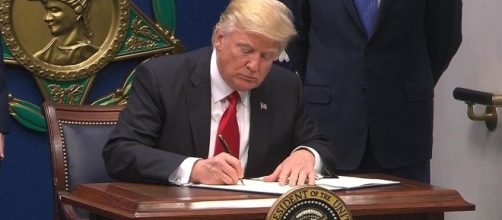It was not enough for President Trump to remove the protections imposed by his predecessor, Barack Obama, in the fight against the effects of climate change. This Thursday, the Republican president signed a new executive order that lifts the veto to the exploitations of polluting energies in Federal Lands declared as national monuments. This classification has hitherto prevented private companies from drilling, in consideration of the protected territories for their conservation.
"Maybe no one likes what he does but I know I'm doing the right thing," Trump said during the ceremony at the Interior Department in Washington.
The president defended that his measure, which will be added on Friday, "returns citizens to power" on federal lands and "end the abuse" by the Government.
Today, I signed an Executive Order @ the U.S. Dept. of @Interior: 'Review of Designations Under the Antiquities Act' https://t.co/590ZX7cUV9 pic.twitter.com/wpqghLqqiF
— Donald J. Trump (@realDonaldTrump) April 26, 2017
'Waste of regulations'
Environmentalists, however, consider the decree to be a serious setback for environmental protections passed by previous presidents, Barack Obama, George W. Bush and Bill Clinton. Trump also acts against the goal established in 1906 by President Teddy Roosevelt who the first to designate a territory as a national monument for its conservation.
On Wednesday, the Republican signed his executive order sitting just below a portrait of Roosevelt in the Interior Department.
The decision by Trump opens the door to reconsider the extension of protected land on more than twenty monuments, including the Grand Canyon to the one dedicated to Pearl Harbor in Hawaii. President Obama began an offensive during his eight years in the White House to extend these type of protections beyond what none of his predecessors had done.
In the absence of federal legislation limiting fossil fuel extractions, the president opted to increase the land covered for conservation. On Wednesday, Trump criticized what he considers a "waste of regulations" and recalled that that territory - more than 100 million hectares - ended up being larger than the State of Texas, the second largest in the country only behind Alaska.
Prevention of energy explorations
Trump stated during the election campaign that he was in favor of protection so that the lands "remain wonderful" and prevent energy explorations from transforming them forever. However, arriving at the White House he has yielded to the pressures of the Republican Party, whose most conservative wing advocates in favor of states, not the federal government, who decide how to regulate their territories.
In addition to the federal land order signed Wednesday, the president is expected next Friday to approve a similar one to open coastal areas to oil drilling in both Atlantic and Arctic protected waters. Trump would undo the moratorium imposed by Obama that prohibited the extractions in this region until 2022.

